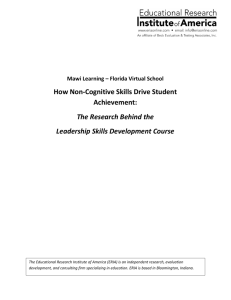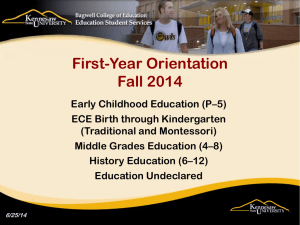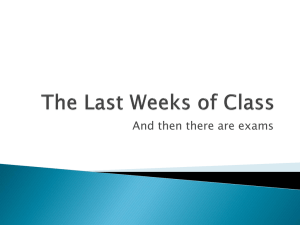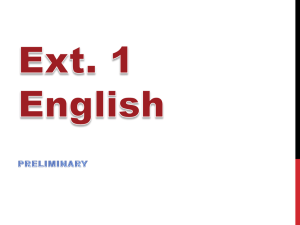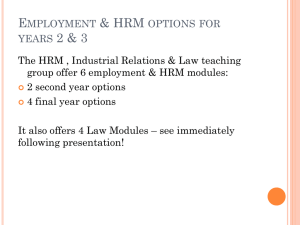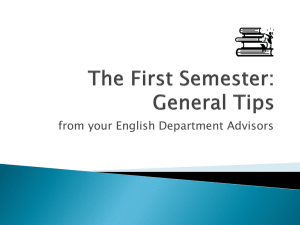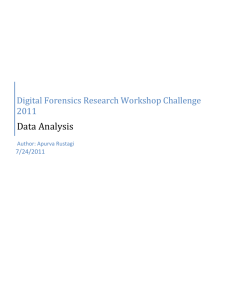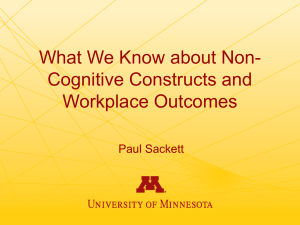CRLA presentation
advertisement
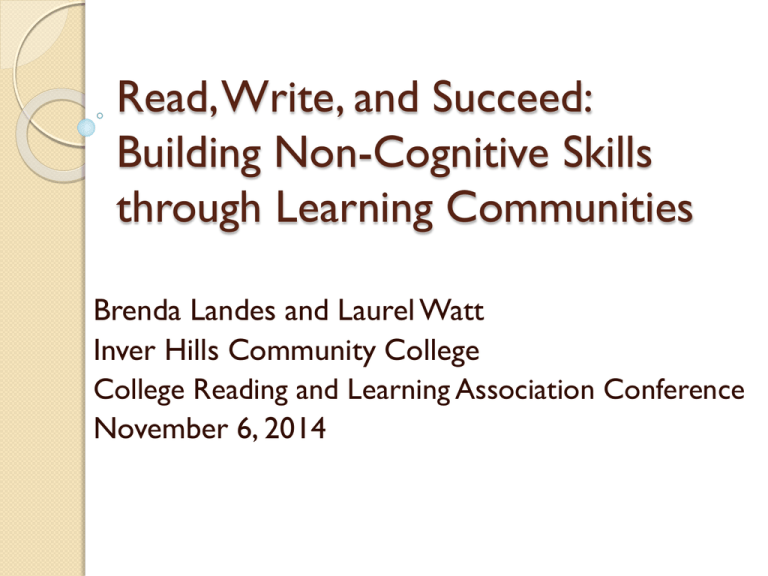
Read, Write, and Succeed: Building Non-Cognitive Skills through Learning Communities Brenda Landes and Laurel Watt Inver Hills Community College College Reading and Learning Association Conference November 6, 2014 What are Non-Cognitive Skills? Persistence Motivation Time Management Study Habits - Paul Tough Motivation “Growth Mind-Set” - Carol Dweck “Grit” - Angela Duckworth Why Should We Address Non-Cognitive Skills with our Students? Success rates in developmental courses Barriers to college completion More action, less talk Growing understanding of the critical role non-Cognitives play in school success at all levels Perspectives on the Importance of Non-Cognitive Traits in Learning Boylan, H. R. (2009). Targeted intervention for developmental education students (T.I.D.E.S.). Journal of Developmental Education, 32(3), 14-18, 20, 22-23. Dweck, C. S. (2006). Mindset: The new psychology of success. New York: Ballantine Books. Tough, P. (2012). How children succeed: Grit, curiosity, and the hidden power of character. New York: Houghton Mifflin Harcourt. The Read, Write and Succeed Learning Community Introduction to College Reading and Writing (READ 90) ◦ Integrates developmental reading and writing at the lower level (two levels below Freshman Composition) ◦ Taught by Reading faculty ◦ 5 credits College Success Strategies (INTS 1101) ◦ A college-level course ◦ Taught by Counseling faculty ◦ 2 credits A Little History on the Development of This College Success Strategies Course Master Student – 2 credit course On Course – 1 credit course, ½ semester College Success Strategies - 2 credit course o Increased focus on study skills Example: Scaffolding of Study Guides o Meets all semester o Case management approach Bi-weekly meetings, frequent email/phone READ 90 Outcomes Select appropriate reading and learning strategies for a specific text passage. Identify main ideas and important details in a text. Apply an expanded understanding of English vocabulary to college reading and writing tasks. Generate coherent writing in response to text. Demonstrate understanding of organizing principles in both reading and writing. Identify the intended audience and purpose for a text. Exercise proofreading and editing skills. INTS 1101 Outcomes Access & utilize appropriate campus technology Use appropriate resources for preliminary career exploration Develop strategies for managing time effectively Develop money management strategies Implement appropriate strategies for solving problems and making decisions that impact academic success including application of campus policies (i.e. Satisfactory Academic Progress) INTS 1101 Outcomes, continued Develop basic digital and information literacy skills Create effective and achievable educational & personal goals Identify & utilize appropriate campus & community resources Articulate strategies for managing stress and life/work/school balance How We Address the Non-Cognitives in Read, Write, and Succeed LCOM Texts ◦ Voices and Values (Townsend Press) ◦ YA books such as The Absolutely True Diary of a Part-time Indian, The Fault in Our Stars, hole in my life, and Copper Sun Writing Assignments ◦ READ 90 essays ◦ Shared, integrated assignments How We Use the Texts Reading comprehension Fluency Writing prompts Application of INTS 1101 course themes and outcomes Active Engagement beyond Personal Reflection Development of new, positive habits An Illustration of Integration and Application Emotional Intelligence Concept & model presented in INTS text Class group activity analyzing characters in Read 90 YA novels and V&V Essays Homework assignment: Self-analysis and personal goal setting Repeated throughout the semester with slight adaptation Examples in your handout Discussion What are some texts you have used or would like to recommend that would support development of non-cognitive traits? Another Illustration Brooklyn Castle Documentary Film Class discussion and paper assignment Writing prompt: What skills do you see the students in the film learning while participating on their school chess team? How do these skills prepare them for both learning in school and in life in general? Why are these skills important for all of us to learn? Our Student Responses: Determination Team Work Patience Focus Concentration Resilience Critical Thinking Persistence Time Management Leadership Performance under Pressure Taking Personal Responsibility Emotional Intelligence – Self Control Logical Thinking Discussion Besides pairing courses or teaching in a Learning Community, how else could you facilitate the development of NonCognitive Skills by your students? What adaptations could you make to your existing courses to add a focus on Non-Cognitive Skills? Evaluating Effectiveness of LCOM Approach Learning and Study Skills Inventory (LASSI) Pre-testing and Post-testing Evergreen Learning Community Student Survey IHCC Institutional Research Office LCOM & Non-LCOM Class Comparisons: Success Rates Across each class, students who enrolled in LCOM classes more frequently ended those classes with a Success as compared to non-LCOM class students over the last 5 years (Fall 2009 – Fall 2013). READ 90 in an LCOM (68%) vs. not in an LCOM (62%) +6% difference LCOM & Non-LCOM Class Comparisons: Retention Across each class, LCOM students were more frequently retained to the second fall compared to non-LCOM students over the last 5 years (Fall 2009 – Fall 2013). READ 90 in an LCOM (50%) vs. not in an LCOM (45%) +5% difference

